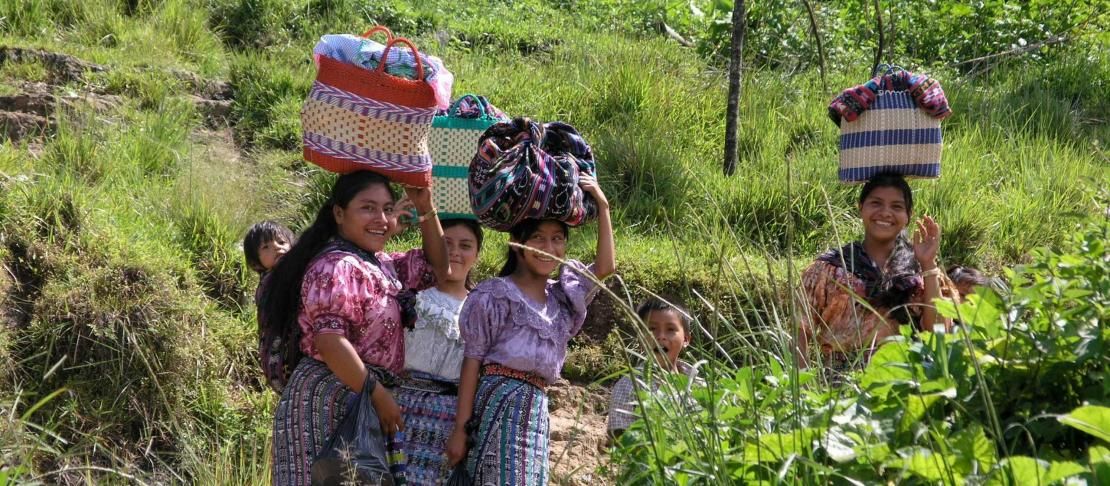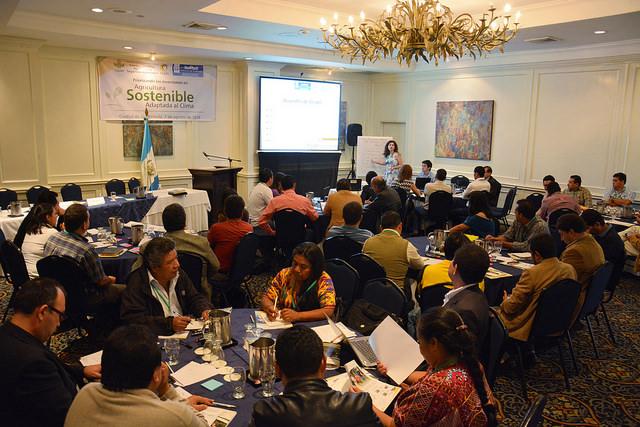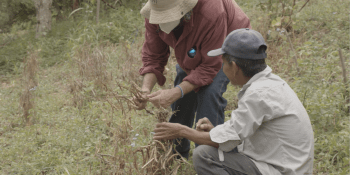Creating a 'learning center' for agricultural development in Guatemala

A workshop held in Guatemala saw knowledge and experiences converge in a participatory process to prioritize investments in agriculture.
In every sense of the word, Guatemala is a country with lots of diversity; especially because of its several ecological regions and its variety of languages and cultures. Thus, in its drive to overcome the challenges raised by climate change, there is a need to consider these and many more factors when it comes to prioritizing interventions in agriculture.
Some of the biggest challenges that the country faces is ensuring food and nutritional security of its citizens, especially when, according to UNICEF, in 2011 about 1.3 million Guatemalan children under five suffer from chronic undernourishment.
Climate change exacerbates these challenges, limiting the ability of food production worldwide. The solution to feed a continuously increasing population might be agriculture intensification, but if this is not done in a sustainable way, its tendency to contribute to climate change may be like 'jumping out of the frying pan and into the fire'
What is climate-smart agriculture?
That is why climate-smart agriculture (CSA) should be an alternative approach to conventional production systems, in order to achieve the goals of improving food security, since these practices offer a 'triple win' for productivity, adaptation to climate change and reducing emissions of greenhouse gases (GHGs).
Based on this concept, the CGIAR Research Program on Climate Change, Agriculture and Food Security (CCAFS) has identified about 30 practices and methodologies aimed at this purpose, with different trade-offs in cost-benefit ratio; however, there is a further need to decide the best practices for each context or region and this requires a careful study to maximize the chances of success.
CCAFS aims to support governments to facilitate this decision making, and to achieve this, have developed a tool for prioritizing investments in climate-smart agriculture. With the support of the World Bank, a pilot program is being developed currently in Guatemala, with subsequent similar works in Vietnam and Mali also being planned.
This project is running in Guatemala in cooperation with the Ministry of Agriculture and Livestock (MAGA), through a participatory process made up of four phases, including government, academia, research centers and productive sectors.

participants from different sectors of guatemalan agriculture attended the workshop. Photo: J.L.Urrea (CCAFS)
The first step in this process was the identification of a strategic focus for the country, as well as the most vulnerable areas and crops; the second step was the workshop, called 'Prioritizing investments in Climate-Smart Agriculture', that gathered university researchers, government institutions, international development agencies and representatives of producers ‘associations in Guatemala City, to exchange knowledge and refine the list of practices jointly with other key stakeholders across the country.
Carlos Anzueto, Deputy Minister of Economic Development at MAGA, who also chaired the opening of the workshop, emphasized the importance of this project that meets the specific needs of the country, and also highlighted the participatory and inclusive approach:
"The purpose is to gather many institutions from the academic, governmental, research and local power to share knowledge, interventions and experience from other places to determine most effective interventions to mitigate the effects of climate change. Also, we can share experiences, risk-attention protocols and intervention proposals that will be economically viable, efficient and culturally feasible to implement in each one of the territories."
After a long day that included the participation of numerous stakeholders from the agricultural sector in Guatemala, the CCAFS team shared with the audience the research previously developed and used as an input for the workshop, as well as preliminary assessments of the potential impact of the practices explained.
Participants were divided into working groups and each one of them, from their perspective, made valuable contributions to improve the prioritization process, like the synergy of various practices and contextualization in different regions due to different environmental threats or present and future risks. The multidisciplinary nature of the participants enriched the workshop greatly.
With great enthusiasm, representatives of different sectors such as forestry expressed their interest in participating more actively in the process. Ana Lucia Solano, researcher from the Center for Environment and Biodiversity Studies at the Universidad del Valle de Guatemala, concluded that:
"The workshop has been a very rewarding job; I could share with people from various sectors on the perspective that everyone has about agriculture in Guatemala. The activity has been quite dynamic, easy to follow and with good achievements. "
She also talked about the benefits of the project:
"The agricultural sector can benefit a lot from this project because there are many things to do, but resources are limited and there is need to prioritize; we cannot meet all needs, but can be defined based on the criteria of experts and people who know most about production systems, how to better prioritize and direct the investments."
The next phase of the process will use the results, weighted criteria and indicators discussed in the workshop as inputs in economic modeling tool and prioritization. The workshop information will be supplemented with primary data, scientific literature, and expert knowledge to analyze the costs and benefits of each climate-smart agriculture option to generate different investment portfolios.
At the end of the prioritization exercise, Guatemala will have a specific climate-smart agriculture investment portfolio, which provides valuable information for selecting the most appropriate practices or approach to invest in agriculture according to national context, environmental and socio-economic challenges as well as serve as a model to replicate in other regions of the country and around the world.
View the photos of the event on Flickr
José Luis Urrea is Communications Officer for CCAFS Latin America
Follow us in Twitter: @CGIARClimate_LA for updates of the program.



